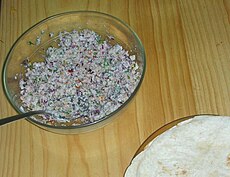Mas huni
 Mas huni with roshi (tortilla) | |
| Type | Breakfast dish |
|---|---|
| Place of origin | Maldives |
| Region or state | South Asia |
| Serving temperature | With freshly baked tortilla[1] |
| Main ingredients | Tuna and grated coconut |
| Variations | Baraboa (Pumpkin) mas huni |
Mas huni is a typical Maldivian breakfast, comprises tuna, onion, coconut, and chili.[2] All ingredients are finely chopped and mixed with the grated meat of the coconut. This dish is usually eaten with freshly baked roshi flatbread and sweetened hot tea.[1]
Preparation
The fish used in mas huni was as a rule cured tuna valhoamas but currently many Maldivians use canned tuna.
Traditionally when fish was scarce, chopped leaves were added to the mas huni mixture. The green leaves of certain local plants and trees such as diguthiyara (Senna occidentalis), kuḷhafilaa or gōramfau (Launaea sarmentosa), mābulhā (Abutilon theophrasti), muranga (Moringa oleifera), massāgu (Amaranthus spinosus or Amaranthus viridis) sweet potato (Ipomoea batatas) and ḷos (Pisonia grandis), among others, replaced the fish in mas huni in a smaller or greater proportion.[1]
Currently common mas huni dish is made with kopee (Collard Greens) leaves.
Other variant of mas huni is made with muranga pods (Moringa oleifera) instead of thick, lucious leaves. First the pods are boiled, then the flesh with the seeds is scooped out. This is mixed along with the rest of the ingredients. This same type of thicker mas huni can be also made with boiled butternut squash or pumpkin.[3]
See also
References
- ^ a b c Xavier Romero-Frias, The Maldive Islanders, A Study of the Popular Culture of an Ancient Ocean Kingdom, Barcelona 1999, ISBN 84-7254-801-5
- ^ Tom Masters. Maldives. Lonely Planet, 2006. ISBN 1-74059-977-2, ISBN 978-1-74059-977-1. Pg 84
- ^ Himāl Southasian - Eating on the Islands
Bibliography
- Xavier Romero-Frias, Eating on the Islands, Himāl Southasian, Vol. 26 no. 2, pages 69–91 ISSN 1012-9804
External links
- Eating on the Islands - As times have changed, so has the Maldives' unique cuisine and culture
- Mas huni and Masriha - Himal: Farms, Feasts, Famines; Disappearing foods
